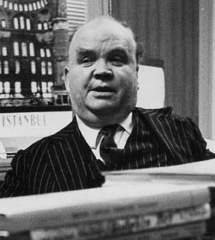
I ponder Connolly, one of the godfathers of what used to be called “the permissive society”, as a Brandenburg Concerto (period instruments) expands into the dimmer and dustier corners of the Undercroft like a brilliant and intricate planetarium made of sound. Philoprogenitive Bach (twenty children by two wives) is a favoured intellectual and aesthetic remedy around here for the generalised pretence and gimcrackery of modern life (a more satisfactory antidote, perhaps, than Sir William Walton, whose modestly attractive oeuvre we owe, by her own account, to the abortions he demanded of his young Catholic wife).
 Connolly was an astute, erudite critic and a formidable stylist, who deserves to be remembered if only for such book titles as The Condemned Playground and The Enemies of Promise, even as the books themselves retreat from view. He believed that it was his destiny to deliver himself of The Great Novel – but he never did, despite the rational precaution of childlessness. The consciousness of artistic sterility tormented and further paralysed him, together with a semi-legendary, Oblomovian sloth. His wife, Barbara Skelton, describes him lying inert for hours at a time, the sheets (which he was in the habit of chewing) spilling from his mouth “like ectoplasm”. Naturally, he permitted himself to pronounce upon religious themes:
Connolly was an astute, erudite critic and a formidable stylist, who deserves to be remembered if only for such book titles as The Condemned Playground and The Enemies of Promise, even as the books themselves retreat from view. He believed that it was his destiny to deliver himself of The Great Novel – but he never did, despite the rational precaution of childlessness. The consciousness of artistic sterility tormented and further paralysed him, together with a semi-legendary, Oblomovian sloth. His wife, Barbara Skelton, describes him lying inert for hours at a time, the sheets (which he was in the habit of chewing) spilling from his mouth “like ectoplasm”. Naturally, he permitted himself to pronounce upon religious themes:
“In my religion, there would be no exclusive doctrine; all would be love, poetry, and doubt.”
Surprise, surprise, eh?

5 comments:
Nice post. I try not to listen to too much because "non sum dignus"... I am not worthy of so much beauty for a prolonged period of time. Bach's music is beautiful but it is almost unworldly. You can almost hear Bach praying in all of his pieces, from a cantata to a fugue. I think that very few people really ever "get" the Gospel. Whenever I listen to the Gloria from the Mass in B minor, I always conclude that Bach "got it".
I try to stick to French baroque (Lully, Charpentier, etc.) because they seem much more earthly and in tune with the pace of my Latin blood.
no exclusive doctrine; all would be love, poetry, and doubt
oh, no. You don't have to make up that religion; we've already got it. It's called "Anglicanism."
Connolly and Waugh - which endures?
Connolly and Waugh - which endures?
Well, yes - quite. To Connolly's credit he had at least some humility, as an epitaph reveals:
At Eton with Orwell
At Oxford with Waugh
He was no-one after
And no-one before.
Waugh was fascinated with him - particularly his artistic impotence despite his undoubted talent. He enjoyed attributing this, to Connolly's considerable irritation, to "Irishry": under the veneer of cosmopolitan erudition "afraid of the little people, afraid of the dark, afraid of the bog priest".
Great bllog you have here
Post a Comment